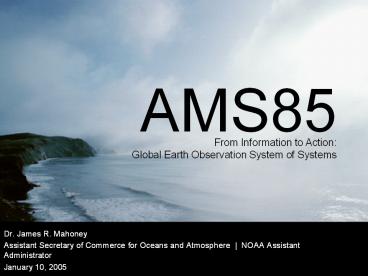AMS85 - PowerPoint PPT Presentation
1 / 14
Title:
AMS85
Description:
Wet deposition trends. Aerosol composition. Global ozone distributions. Forest fire locations ... Collaborators from many universities, companies, agencies, and ... – PowerPoint PPT presentation
Number of Views:15
Avg rating:3.0/5.0
Title: AMS85
1
AMS85
From Information to ActionGlobal Earth
Observation System of Systems
- Dr. James R. Mahoney
- Assistant Secretary of Commerce for Oceans and
Atmosphere NOAA Assistant Administrator - January 10, 2005
2
Benefits of Earth Observations
3
Earth Observations Value Harmful Algal Blooms
- GOESS requires cross disciplinary partnerships
Research Operations
Oceanographers
Meteorologists
Biologists
4
Earth Observations Value Health
- Malaria killed more than a million people in 2003
- Primarily in developing world
- Early warning system
- Temperature
- Humidity
- Vegetation
- Soil Moisture
- Possible outbreak prevention
AVHRR
AVHRR-SST
TOPEX-SSA
SeaWiFS-Chl-a
5
Earth Observations Value Air Quality
Observations Wet deposition trends Aerosol
composition Global ozone distributions Forest
fire locations
Improved Understanding Aerosol formation Nighttime
chemistry Boundary layer Emissions
Modeling Aerosol mechanisms Boundary
conditions Data assimilation Operations
Collaborators from many universities, companies,
agencies, and countries
6
Earth Observations Value Agriculture
- Production tied to healthy environment sound
planning - Understanding El Niño/La Niña patterns
- Worldwide benefits to agriculture
- Help predict understand droughts, harvests,
potential crop damage - Make decisions based on sustainable agriculture
practices
7
Earth Observations Value Water Resources
Observations
Sound Decision Making
8
National Integrated Drought Information System
(NIDIS)
- Supported by Western Governors
- Key Components
- Integrated National Drought Monitoring
Forecasting System - Multi-agency collaboration NOAA lead
- Facilitates information exchange between local,
state and federal agencies - Proactive, Not Passive, Drought Response
- Improve Drought Indicator Data/Networks
(Physical, Hydrological, Socio-Economic, Impacts) - Integrate Interpret that Data with Easily
Accessible Understandable Tools - Near-term Outcome of Strategic Plan for the U.S.
Integrated Earth Observing System
8
9
Administrations Response to the U.S. Commission
on Ocean Policy
- December 17, 2004
- Executive Order Committee on Ocean Policy
- U.S. Ocean Action Plan
10
Committee on Ocean Policy
- Chaired by chairman of the White House Council on
Environmental Quality - Cabinet level membership
- Will advise President and heads of agencies on
policies concerning ocean-related matters - Responsibilities
- Ocean science and technology
- Ocean literacy and education
- Ocean resource management
11
U.S. Ocean Action PlanAction Highlights
- Create a National Water Quality Monitoring
Network - Implementing New Legislation on Oceans and Human
Health, Harmful Algal Blooms and Hypoxia - Expanding NOAAs Authority to Education and
Outreach - Improved Management of Coasts and Watersheds
- Share U.S. Ocean Science Expertise Abroad
- Support Marine and Multi-modal Transportation
- Integrate U.S. Ocean Observing Efforts into the
Global Earth Observing System of Systems (GEOSS)
12
Indian Ocean Tsunami Tragedy
- NOAA deploying existing DART buoys to Indian
Ocean - Buoys transmit vital data to established
satellite networks - USGS real-time data and tide gauges information
- Increased coordination with affected countries
- Part of Global Earth Observing System of Systems
(GOESS)
13
NOAAs TsunamiReady Program
- Increased awareness/education
- Maximize warning dissemination methods
- Emergency management/NOAA cooperative effort
- 15 TsunamiReady Communities in 5 states
- Including UCSB first higher learning
institution recognized
14
Focus on Education




























